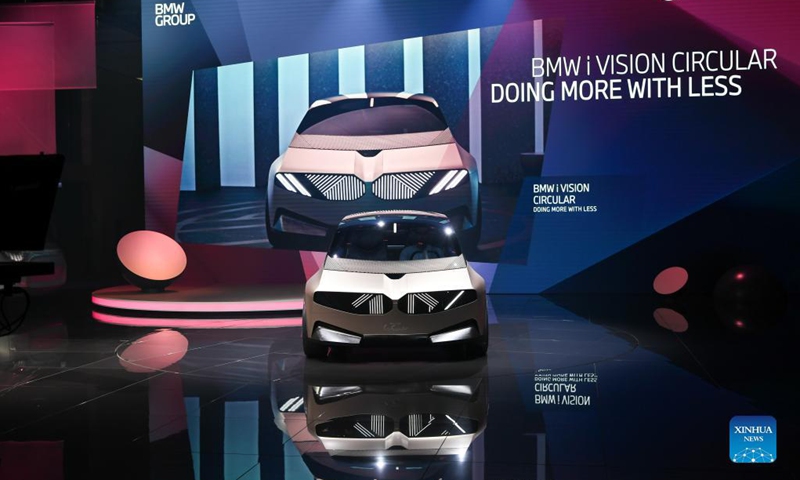
A BMW i Vision Circular concept car is on display during the media day of the motor show IAA Mobility in Munich, Germany, on Sept. 6, 2021. German carmaker BMW on Monday unveiled the BMW i Vision Circular, a concept car that is built from recycled and sustainable materials, and is 100 percent recyclable. (Photo: Xinhua)
Automaking powerhouse Germany is opposed to a ban on internal combustion engines from 2035 provided they work on synthetic fuels, the country's transport minister said Monday.The European Commission proposed in 2021 a ban on the sale of new cars with internal combustion engines from the middle of next decade, but the debate is far from over.
"We want to allow combustion engines after 2035 only if they can be refueled exclusively by synthetic fuels," Volker Wissing said on the sidelines of an informal meeting of EU transport ministers outside of Paris.
"There must be a technical solution to guarantee that they can't be refueled with fossil fuels," he added.
Synthetic fuels, which could be used by current cars with little or no modification, might be able to considerably lower emissions depending on how they are produced.
The meeting of transport ministers looked at innovation to decarbonize road transport among other issues.
Wissing backed the position of the French EU presidency that hybrid vehicles can be useful to reduce carbon emissions.
"Today we don't have enough EVs [electric vehicles], we need to scale up their availability," Wissing said.
"So it's better that people use hybrid technology as an intermediary solution," he added.
At the latest UN climate meeting in 2021, more than two dozen countries and car companies pledged to work on ensuring that by 2040 only zero emission vehicles are sold.
But major carmaking nations did not sign up.
Germany, in particular, criticized the fact that synthetic fuels were left out.
Wissing also advised against relying upon one technology, and said government policies should pick winners.
"We can't only bank on electric mobility or hydrogen for the future," Wissing said Monday. "We need to remain technology-agnostic."
Airlines are counting on the emergence of sustainable or synthetic fuels to reduce their carbon emissions.
AFP
